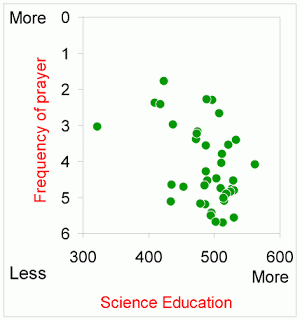 One of the striking features of religion is the way in which the intensity of religious fervour varies from time to time and from place to place. The past two centuries have been witness, in the industrialized world at least, to a slow decrease in the importance of religion for most people. Sociologists have come up with a number of theories to explain this phenomenon. A classic explanation was made famous by Max Weber, a German who was one of the founding fathers of modern sociology in the early 20th century. Weber believed that the increasing influence of science would lead to disenchantment with religion. According to Phillipa Norris and Ronald Inglehart, in their book Sacred & Secular (Chapter 1):
One of the striking features of religion is the way in which the intensity of religious fervour varies from time to time and from place to place. The past two centuries have been witness, in the industrialized world at least, to a slow decrease in the importance of religion for most people. Sociologists have come up with a number of theories to explain this phenomenon. A classic explanation was made famous by Max Weber, a German who was one of the founding fathers of modern sociology in the early 20th century. Weber believed that the increasing influence of science would lead to disenchantment with religion. According to Phillipa Norris and Ronald Inglehart, in their book Sacred & Secular (Chapter 1):
In this perspective, the era of the Enlightenment generated a rational view of the world based on empirical standards of proof, scientific knowledge of natural phenomena, and technological mastery of the universe. Rationalism was thought to have rendered the central claims of the Church implausible in modern societies, blowing away the vestiges of superstitious dogma in Western Europe. The loss of faith was thought to cause religion to unravel, eroding habitual churchgoing practices and observance of ceremonial rituals, eviscerating the social meaning of denominational identities, and undermining active engagement in faith-based organizations and support for religious parties in civic society.
The publication last week of the international PISA assessment of student’s science competency gives an opportunity to test this theory. PISA used a standard test in over 40 countries – OECD nations and OECD ‘partners’. Each country was given a score according to how well its pupils did. These results can be put together with international survey data on the frequency of prayer (for example, from the World Values Survey and the International Social Survey).
The result, shown in the figure above, is statistically significant (P=0.006), but the association is tiny (r^2=18%). What’s more, the association is weakened somewhat after you adjust the science scores for differences in GDP, and it disappears altogether after adjusting for socio-economic differences between the countries (see figure below).
On the basis of this evidence, at least, it seems that science education has no direct effect on the intensity of religious belief.














